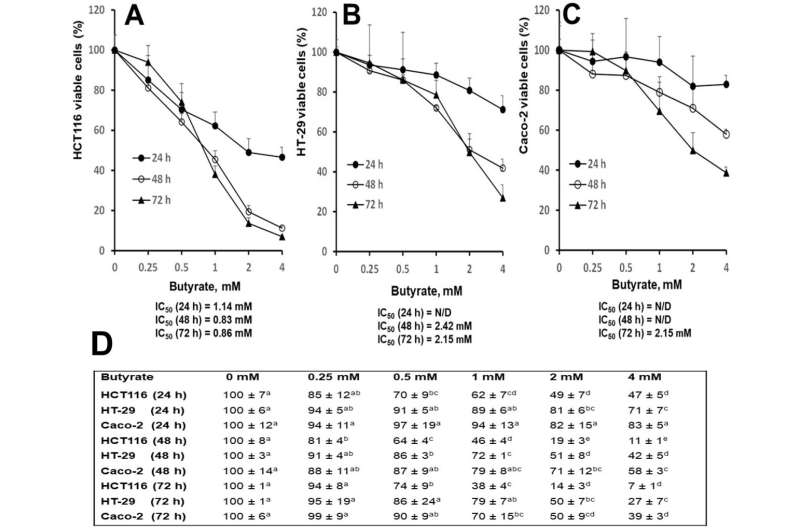This article has been reviewed according to Science X's editorial process and policies. Editors have highlighted the following attributes while ensuring the content's credibility:
fact-checked
trusted source
proofread
Scientists find butyrate's possible anticancer potential is cell-type specific

Scientists with the USDA's Agricultural Research Service, Grand Forks Human Nutrition Research Center and the University of Massachusetts, examined how butyrate, one of the short-chain fatty acids found in the gut, suppresses the growth of different colon cancer cells in the laboratory.
The results of the study published in Nutrients show that the benefit of butyrate is specific to the cell line studied and is apoptosis-dependent, a process of gene-directed cell death (this a molecular mechanism that plays a crucial role in removing damaged or mutated cells selectively from tissues in an orderly manner).
Diet composition is among several factors that can contribute to the prevention of colon cancer. Consuming a healthy diet that is high in fiber and low in saturated fat can help maintain a healthy gut microbiome, a community of microorganisms, including bacteria, that live in the human gastrointestinal tract.
The large intestine, commonly known as the colon, hosts a diverse group of bacteria that play a significant role in breaking down fiber and non-digestible carbohydrates, producing short-chain fatty acids (like butyrate) during the process. These fatty acids serve as the main energy source for normal colonic cells, reduce intestinal inflammation, and help increase bacterial diversity, therefore improving colon health.
A healthy balance of gut microbes can significantly reduce the risk of developing chronic diseases, such as colonic inflammation and cancer.
"This study provides a greater understanding of butyrate and how it inhibits colon cancer cell growth at the molecular level," said Huawei Zeng, a research molecular biologist with the Grand Forks Human Nutrition Research Center in Grand Forks, North Dakota. "Findings show that the inhibitory efficacy of butyrate against colon cancer cells is cell type-specific, which may partially explain its anticancer property and clinical variability."
The data collected from the findings of this research with butyrate will help the team of scientists in an upcoming five-year project. The project focuses on the impact of lentil consumption on colon health in models of obesity.
"Lentils are an excellent source of dietary fiber and bioactive compounds that can benefit our health," said Zeng. We are currently working on a multi-year project that aims to examine the connection between butyrate and lentil's dietary fiber. This will help us develop robust lab analyses to evaluate the beneficial effects of each lentil variety on colon health before we proceed to do in vivo research outside of the laboratory."
A comprehensive review led by Zeng was published in the International Journal of Molecular Sciences on the progress in knowledge concerning the effects of short-chain fatty acids on the proliferation of colon epithelial cells, inflammation, cancer, and the associated microbiome.
The recently published study provided valuable insights to scientists. Still, more studies are needed to fully understand the potential of butyrate in fighting cancer cells.
More information: Sema Oncel et al, Efficacy of Butyrate to Inhibit Colonic Cancer Cell Growth Is Cell Type-Specific and Apoptosis-Dependent, Nutrients (2024). DOI: 10.3390/nu16040529



















